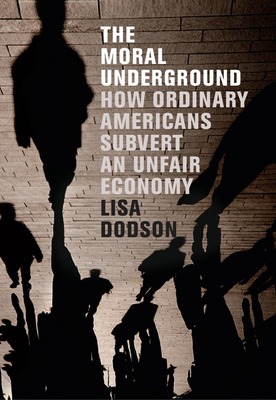
Lisa Dodson uncovers a silent revolution in her new book, The Moral Underground-How Ordinary Americans Subvert an Unfair Economy
Originally published in the Northside San Francisco in October 2010
It is criminal to have people working on a full-time basis … getting part-time income —Martin Luther King, Jr.
I pad their paychecks because you can’t live on what they make —supervisor of a fast-food pizza restaurant
In her latest book Lisa Dodson, a professor of Sociology at Boston College, examines the survival of the working poor and those who take personal risks to help them, a side of American life which is often neglected in the mainstream media.
In 2008, over 40 million jobs in the United States paid less than twelve dollars an hour, and 25 million of these paid less than 10 dollars an hour. The economic crash of 2008 exacerbated an already broken system. The unemployment situation is dire, but the life of the underemployed remains unexamined. The chronic hardship of working Americans who can’t make ends meet becomes worsened by a shrinking job force which demands that those who still have jobs must continue to do more work for the same or sometimes less pay.
The Moral Underground contains confessions of mid-level managers, supervisors and workers who silently act out what Dodson calls “moral disobedience”, a kind of social justice that values community survival over rules and profits. Dodson explains how low wage workers lives are made complex by poverty. They can’t afford child care, they have transportation problems, and they often have to come in to work when they are ill. Dodson’s book is full of stories about restaurant managers turning a blind eye to tardiness or feeding families for free, supervisors allowing the children of employees in the workplace, nurses who agree to treat the un insured, and teachers who divert resources and personal time to assist needy and troubled children.
This isn’t to suggest that these same managers and supervisors are immune to common opinions of the market-driven culture in which we live. It’s a “chicken and the egg” argument: some middle class workers still believe low wage employees and their daily struggles relating to poverty are caused instead by their lack of a so-called “work ethic.” Dodson deconstructs this argument by posing questions such as “Is it a lack of a work ethic that causes a mother to leave her job to care for an ailing child or parent?”
Sometimes a different logic wins out. Working side-by-side, day after day with individuals who simply can’t make ends meet, managers bend the rules and help their staff because their consciences override their prejudices when confronted with need.
Lisa Dodson’s book shows the human consequences of an unfair economic system and the citizens who quietly risk their own jobs to promote the well being of family and community above all else. It is a story of grass-roots activism, bravery and ultimately hope for a more equitable economic future.